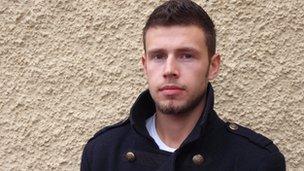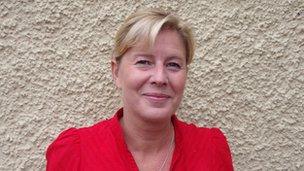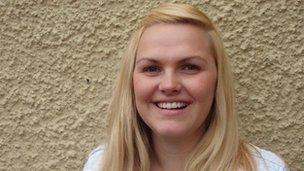Porthcawl family reveal their experience of war
- Published
On the 10th anniversary of war in Afghanistan, and in the run-up to Armistice Day on 11 November, BBC Radio Wales' Eye on Wales programme hears the story of one south Wales family's experience of war and its aftermath.
LLOYD JONES
"I grew up in Porthcawl. When I was 16 when I joined the Army. It's the most masculine thing you can do. At 16, you're not grown up, and you're not a child - you think the Army will make a man out of you.

Lloyd Jones has served in both Iraq and Afghanistan
I served seven years with the Royal Artillery as part of an FST (Fire Support) Team.
My first tour was in Iraq, and then I went to Afghanistan in 2009. It doesn't really hit home until you get on the bus, and the boss shakes everyone's hands and says: "I hope I see you again".
It's the biggest adrenalin rush you'll have. You've trained for years and years and you're finally doing it. Everything gets drilled into you, and it's as easy to fire your rifle as it is to breathe. I felt like 10 men. It's not like a PlayStation game. It's real life, but then it starts to feel like a game.
Whilst I was on rest and recuperation (R&R), I lost a close friend. In my eyes we were all invincible, we were bulletproof, but then he got it.
Then another two of my close mates got blown up. I'd spent every night with them. They were my brothers.
Every time you go out, you think: "If I step there, that could kill me". Or it'd be quiet, and whoosh, bullets fly over your head. How do you get used to that? You don't.
War changes everybody, and then you come back and you're uncomfortable.
I drank a lot. I thought I was good at it. But I'd wake up in the morning and think: "What's happened? Why's the place in a mess?"
Then I'd come round, and my hands would be hurting. There'd be blood all over my knuckles, where I'd just come in and destroyed the place and gone to bed. I couldn't remember a thing.
That's when I put my hands up and said this isn't right. We sought help and found out I was suffering from Post Traumatic Stress Disorder (PTSD).
I've been clean now for six weeks. This is a hurdle I've got to get over. I'm not one for staying down."
SARAH REES - LLOYD'S MOTHER
"I stopped Lloyd from having guns when he was a child. I should have given him a toy gun in the first place and maybe he would have got it out of his system.

Sarah Rees said Lloyd's first tour was her worst experience
The Army was good for him. It gave him a good career, taught him to be a man, and gave him discipline. We liked what we saw, and were very grateful.
But we knew what was coming up. At the time there was Iraq and Afghanistan hanging over his head.
Lloyd's first tour was in Iraq. We said our farewells two weeks before. I never say goodbye, it's always farewell.
Going through your first tour as a parent is the worst experience I've been through. The hardest part is the first fatality.
You don't know the protocol. You don't know that the MoD call you first before the news. So you're sitting there thinking: "Oh my God, is it him?"
Then you hear it's a different regiment, and you breathe a sigh of relief, but you feel guilty. It's not yours, but it's somebody else's.
When Lloyd came home from his second tour on R&R, a colleague of his died. He was a close friend and had taken Lloyd's place whilst he was away. It was carnival day in Porthcawl and it was so surreal.
The tour got worse. There were more fatalities and casualties. Then two of his colleagues were blown up, and we knew we were in trouble when he came home.
He came home in October 2009, and I threw a party for him. Even at that point, we could see there were problems. He was withdrawn, snappy and when he drank, it was to excess. We could see the cracks.
I tried to talk about it, but he was adamant that there was nothing wrong. So we gave it the benefit of the doubt and thought he'd come round.
Then eight weeks ago he got very drunk. We now know that Lloyd's trigger point for PTSD is alcohol. He came to my house and had a flashback.
At one point he saw a glass lamp as the enemy and put his hand through it. I had to rush him in to casualty, but he still wasn't recognising me. Everyone was the enemy. I had to keep saying: "It's me, it's mum".
The next day was the first time he admitted that there was a problem. We sought help as much as we could. Ty Harrison from the Royal British Legion has been fantastic. Through him we've got counselling with the veterans mental health team in Bridgend.
We know it's going to be a long road. He's made major progress just by the fact that he's recognised that he's not going insane.
I don't know how long it's going to be before he can start to accept what happened in Afghanistan. All I know is that we'll stand by him as best we can."
LAUREN JONES - LLOYD'S WIFE
"I was in school with Lloyd and we first started going out when we were nine years old. We got back together again when he was in the middle of his first tour in Iraq. On his return, his mother threw a party and he proposed to me then.

Lauren Jones said when Lloyd first came back from Afghanistan she used to walk on eggshells
The Army always give dates a few years in advance, so I always knew Lloyd would go to Afghanistan, but it didn't hit me until he was on pre-deployment leave. It was nerve-wrecking as I had a small baby.
I remember Alfie's first birthday. Lloyd called and I got him to sing Happy Birthday down the phone. He came home a few weeks after that.
I bought a new outfit to wear so I'd look nice, and put Alfie in a "My daddy's a hero" t-shirt.
The band started playing and they were coming up behind the band. Alfie was shouting Dada. Lloyd was the last one. He looked skinny, tired and ill and had black rings around his eyes.
When we went to bed, it was weird to have someone beside me. I kept rolling on to him. That's when I noticed he'd freak out. He'd grab me by the arm and it would take him a while to wake up and see it was me. Then he'd be apologetic.
The first time it happened, I nearly had heart failure. It was really scary. I'd never seen him like that. I knew he wouldn't harm me, but he had a strange, distant look. That's over two years ago now.
I used to walk on eggshells, but now I don't. If he goes off on one, then so be it. I can't live my life walking on eggshells.
Sometimes I wonder if it is worth all this hassle, but Lloyd is a better person than this. He's got a problem because of being in Afghanistan and he needs help."
Eye on Wales - War Wounds is on BBC Radio Wales on Sunday, 30 October at noon (12:00 GMT)